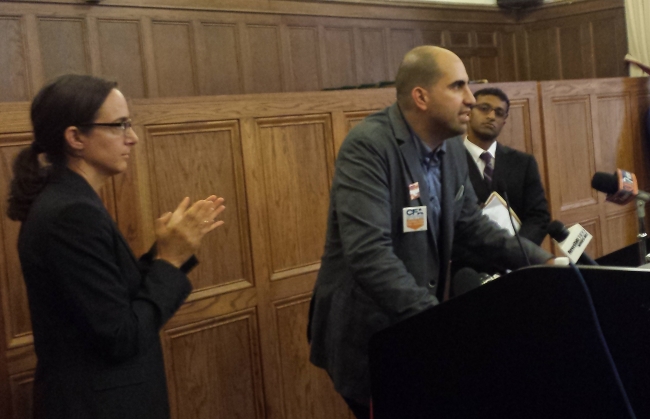You have /5 articles left.
Sign up for a free account or log in.

Maria LaHood, an attorney for the Center for Constitutional Rights, watches Steven Salaita address supporters outside the U. of Illinois Tuesday.
Center for Constitutional Rights
After more than a month of public silence – even on the Twitter account that apparently cost him a job at the University of Illinois at Urbana-Champaign – Steven Salaita spoke out Tuesday. The would-have-been tenured professor of American Indian studies whose offer was pulled weeks before classes started staged an off-campus news conference and granted media interviews, asking for his job back.
“I am here to reaffirm my commitment to teaching and to a position with the American Indian studies program at [Illinois],” he said during a standing-room-only event at the University YMCA; most in attendance appeared to be supporters. “I reiterate the demand that the university recognize the importance of respecting the faculty’s hiring decision and reinstate me.” (A full transcript is available here.)
Salaita said the turmoil surrounding the university’s decision not to pass his faculty-backed candidacy on to the Board of Trustees for approval – considered by many in academe to be a formality – constituted a “teaching moment.” He added: “It is my sincere hope that I can – as a member of this academic institution – engage with the entire university community in a constructive conversation about the substance of my viewpoints on Palestinian human rights and about the values of academic freedom.”
The professor called his Twitter remarks about Israel and Gaza "passionate and unfiltered," but that was the closest he got to any apology for the statements that many – even many of his supporters – have called distasteful. Illinois hasn’t specifically blamed the blocked appointment on Salaita’s Twitter account, which until early August was churning out intense criticism of Israeli military policy, such as: “At this point, if Netanyahu appeared on TV with a necklace made from the teeth of Palestinian children, would anybody be surprised? #Gaza.” But Chancellor Phyllis Wise has said that the university can’t accept “personal and disrespectful words or actions that demean and abuse either viewpoints themselves or those who express them.”
The university also has said it’s willing to consider settling with Salaita. But in an interview with Inside Higher Ed, Salaita reiterated his desire to work at Illinois as soon as possible; he said he and his wife are in limbo after resigning jobs at Virginia Tech (she held a professional position and he was a tenured faculty member) for what they thought was a “done deal” at Illinois. Salaita said his offer had been inked in October 2013, and that he already had ordered books for the two classes he was scheduled to teach this fall. Currently, the couple and their young son are living with family members in the Washington region.
Beyond practical concerns, Salaita said Illinois is where he wants to teach.
“I absolutely still want to work there – it’s a world-class university with terrific faculty, fantastic students and the American Indian studies department is one of the leading departments [of its kind] in the world,” he said. “It would be an honor to join the department and the broader scholarly community at the university.”
Asked about concerns some Jewish students and supporters of Israel have expressed -- including in emails to the university -- about working with Salaita due to his strong views on the Israeli-Palestinian conflict, the professor pointed to his teaching record at Virginia Tech. He said he’d never had a student complaint filed against him, and had strong student and peer evaluations. He also said he was a vocal opponent of “bigotry of any kind,” including anti-Semitism.
Salaita added that the 140-character remarks he made on Twitter were those of a private citizen troubled by world events using a specific social medium. He said his classroom “demeanor” was very different.
Asked if he regretted any of what he’d posted on Twitter, Salaita said: “I feel I’m able to discuss the content and the meaning of what I’ve said in these last two or three months on Twitter and I hope to be able to do that in a professional environment, and that I’m given the opportunity to participate in those kinds of conversations.”
Salaita has retained legal counsel, including from the Center for Constitutional Rights. Anand Swaminathan, a lawyer affiliated with the organization, said that Salaita is focused on getting his job back but that he is prepared to take legal action against the university if that fails, including to seek legal reinstatement.
Robin Kaler, a university spokeswoman, sent the following statement via email following Salaita’s talk: “At the University of Illinois, we are committed to providing our students with a world-class education. While the university stands by the decision not to hire Professor Salaita, we will continue to welcome all speakers to our campus. We remain devoted to fostering a campus-wide dialogue on the most uncomfortable issues that are vital to our very foundation and will continue to work closely with our students, faculty and staff to nurture an environment where all issues, including the most complicated ones, can be discussed.”
Salaita said he believes that external pressure, some of it from donors, factored into the university’s decision to rescind his offer. He said “faculty governance is critical to intellectual life and health of the campus and it’s never a good thing when upper administrators make arbitrary decisions without consulting the faculty and completely ignore the university dialogue.”





